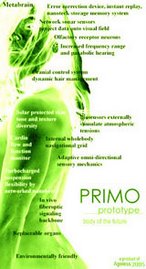Imagine waking up one day to the realisation that the world as you know it is actually an isolated high-tech compound and that you are a clone whose organs are soon to be harvested?
This is the plot to Michael Bay’s recent science fiction blockbuster 'The Island' (2005). The protagonist Lincoln Six-Echo (played by Ewan McGregor) goes on the run after discovering that he is actually a clone kept in a utopian facility, only to be later harvested.
If you thought that this was far fetched, think again. According to Director of Research at the Royal College of the Art (in London) Professor Sandra Kemp, “we are already doing [this] with stem cells but not with fully grown people or babies. Scientists are already cloning human stem cells and animal stem cells”, for transplantation purposes.
In 1997, Robert Pennington (of Dallas, USA) faced acute liver failure and no available human match. He underwent a pioneering surgical operation that connected him to a transgenic pig’s liver, whilst he waited for a human donor. To date, Pennington believes his life was saved by Wilbur the transgenic pig. Organs of transgenic animals are genetically modified to be human compatible. This process is known as animal Pharming.
Although Professor Kemp says she has not come across any case whereby a human clone had been harvested in this manner, she does not see why this would not be possible in the near future.
Genetic engineering has seen a shift in recent years from medical to cosmetic purposes, to help curb our limitations as human beings. In 2002, cyborg professor Kevin Warwick gave himself an ultrasonic sensory ability. The professor of Cybernetics at the University of Reading (in England) said, “those who want to stay humans, you’re going to remain a sub-species”.
Professor Kemp predicts that in our search for the perfect human race, we will arrive at a future form of racism, whereby the genetically modified being will be considered superior to those who are not.
Kemp admitted that if she was in the position of genetically enhancing her embryo to bear a superior being, she would, considering everyone else would be doing it and if she did not, her child would be at a disadvantage.
Here are a few questions Professor Kemp asked the audience at her ‘Human enhancement: Future designs and bio features’ lecture:
- Would you enhance your body and/or mind?
- Would you have a genetically engineered baby?
- Would you accept an animal part?
Respond with your answers.
Stay tuned for my next blog post for a video/audio slide of the interview with Kemp.
Subscribe to:
Post Comments (Atom)

No comments:
Post a Comment